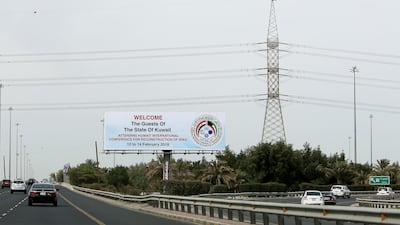Iraq will seek this week to raise billions of dollars from governments and private investors to fund reconstruction in areas of the country devastated by the war against ISIL.
A three-day international donor conference opens in Kuwait on Monday with representation from 70 countries and thousands of international companies who will be presented with opportunities in the rebuilding of Iraq’s crumbling infrastructure and war-torn cities. And with western powers suffering from donor fatigue after years of turmoil in the region, hopes are resting on Gulf Arab states to step forward for Iraq.
Prime Minister Haider Al Abadi says his country needs up to $100 billion for projects to rehabilitate the country after three years of brutal fighting.
"It's a huge amount of money. We know we cannot provide it through our own budget," Mr Al Abadi said during the World Economic Conference in Davos last month. "That's why we are resorting to investment."
According to reconstruction plans presented at Davos, Iraq is seeking to "reconstruct the country's physical structure, build up capacity in order to protect society against extremists, and to maintain an effective economic cycle".
Iraqi officials said rebuilding and developing hospitals, schools, homes, roads and telecommunications was the key to providing jobs, returning hundreds of thousands of displaced people to their homes and ending several decades of political and sectarian violence.
In Mosul, one the hardest hit areas during the war, nearly 40,000 homes need to be rebuilt or repaired before millions of residents displaced by the fighting can return, according to the UN.
The Iraq government is expected to showcase 157 reconstruction projects at the three-day conference, which is supported by the World Bank and United Nations.
International organisations are expected to announce their plans on the first day, while attending donor countries are expected to make their pledges on the third.
The World Bank has already said it would launch a US$300 million (Dh1.1 billion) project to improve the living conditions of more than 1.5 million poor families in Iraq.
Nussaibah Younis, associate fellow at the British think thank Chatham House, said traditional donors such as the US and European states were unlikely to shoulder the burden of reconstruction.
"They feel fatigued by the ongoing financial demands of the Iraq-Syria crisis, and with Iraq in particular they feel they have paid for reconstruction before and are not about to pay for it again," she told The National.
US officials have already indicated that Washington is not planning to announce any further contributions at the conference and will instead encourage investment from the private sector and Gulf Arab allies.
The US said last month that it would give $150m this year for restoring basic utilities in Iraq and providing grants to small businesses, taking Washington's contributions social projects since 2015 to $265.3m dollars.
Ms Nussaibah said it was "encouraging" that "Gulf states look set to make substantial contributions at the conference, after years of intensive US diplomacy seeking to persuade the Gulf to engage more positively in Iraq".
US officials are counting on Saudi Arabia in particular to invest in Iraq’s private sector, which is seen as a means to counter Iranian influence in Iraq.
The Iraqi government set up a reconstruction fund in 2015 to oversee efforts to restore areas affected by terrorism so that people who had fled could return.
"Anbar was where this project launched — we currently have 52 strategic projects there which we are hoping to complete within the next two months," the president of the fund, Mustafa Al Hiti, said.
Iraq reopened to foreign investment after the US-led invasion that toppled dictator Saddam Hussein in 2003, but the majority of the billions invested went to increasing its oil and gas production.
_______________
Read more:
Mayor of Baghdad aims to regenerate the city and twin it with Paris
Iraq storms ISIL camp and retakes villages in north-east desert region
Jordan approves Iraq pipeline, as Baghdad looks for alternative export routes
_______________


